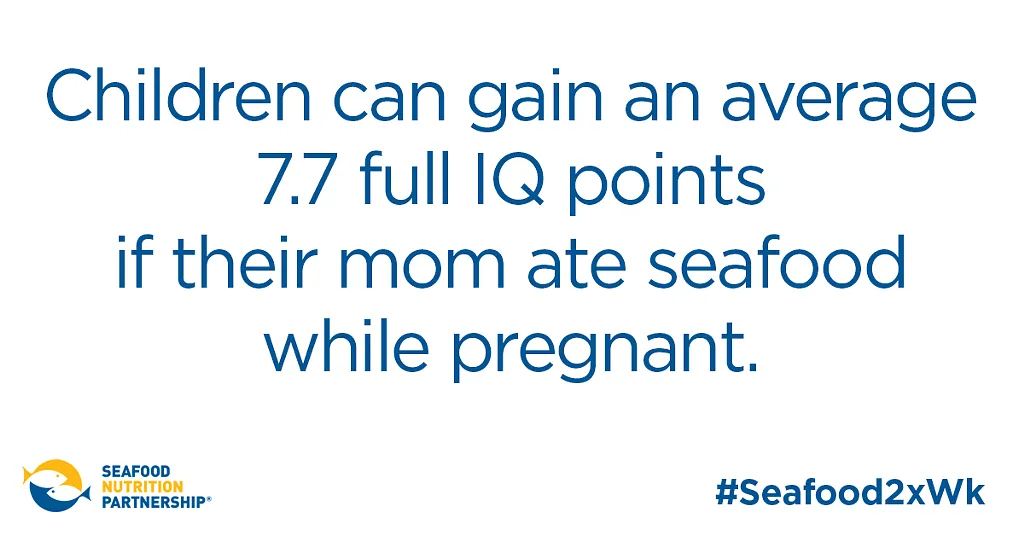Scientific review shows children can gain an average of 7.7 full IQ points

A new paper published by a group of 13 leading dietary fats scientists highlights the tremendous health benefits from consuming seafood for infant and adolescent brain development. Among the key findings of the systematic review is an average 7.7 IQ point gain in children whose mothers ate seafood during pregnancy compared to mothers who did not eat seafood.
“Relationships between seafood consumption during pregnancy and childhood and neurocognitive development: two systematic reviews” (PLEFA) uncovered 44 scientific studies since 2000 that collectively show the importance of consuming seafood by moms to support the brain development of their babies as well as the need for children to consume more fish and shellfish.
“There is a lost opportunity for IQ when mothers are not eating enough seafood,” the paper’s lead author, Capt. Joseph Hibbeln, MD, Acting Chief, National Institute on Alcohol Abuse and Alcoholism, said at the State of the Science Symposium.
The 13 scientists formed a technical expert collaborative to address two questions posed by the 2020 Dietary Guidelines Advisory Committee (DGAC), and utilized the USDA’s Nutrition Evidence Systematic Review to evaluate the science following the DGAC prescribed review process.
Highlights from the paper, which evaluates studies on 102,944 mother-offspring pairs and 25,031 children, includes:
Twenty-four studies reported that seafood consumption among mothers was associated with beneficial outcomes to neurocognition on some or all of the tests administered to their children. The beneficial outcomes appeared on tests administered as early as three days of age and as late as 17 years in age.
This scientific review shows children gain an average of 7.7 full IQ points when their moms ate seafood during pregnancy compared to moms that did not eat seafood. The size of benefits for IQ ranged from 5.6 to 9.5 points.
In addition to IQ, measures of neurocognitive outcomes included verbal, visual and motor skill development, scholastic achievement, and four specifically looked at hyperactivity and ADHD diagnoses. One finding showed that children of mothers not eating oily seafood had nearly three times greater risks of hyperactivity.
Benefits to neurocognitive development began at the lowest amounts of seafood consumed in pregnancy (one serving or about 4 oz per week) and some studies looked at greater than 100 oz. per week. No adverse effects of seafood consumption were found for neurocognition in any of the 44 publications, indicating that there may be no upper limit to seafood’s benefits for brain development.
Seafood contains protein, vitamins B-6, B-12 and D, and omega-3 fatty acids that as a whole package contributes to these important outcomes. This systematic review looks at seafood as opposed to any single nutrient.
“The risk is not eating enough seafood -- the benefits are substantial for the development of baby brains, eyes and overall nervous system,” said J. Thomas Brenna, PhD, an author of the paper and a member of the 2015-2020 Dietary Guidelines Advisory Committee.
These findings are consistent with a technical report from the American Academy of Pediatrics earlier this year that emphasized the importance of fish and called attention to the fact that U.S. children are not eating enough seafood. Additionally, Health Canada, the European Food Safety Authority, and World Health Organization have all stated the importance of seafood for brain development.
The authors of the paper, or the technical expert collaborative who conducted the systematic review, include: Capt. Joseph Hibbeln, MD; Philip Spiller, JD; J. Thomas Brenna, PhD; Jean Golding, PhD; Bruce Holub, PhD; William Harris, PhD; Penny Kris-Etherton, PhD, RDN; Bill Lands, PhD; Sonja Connor, MS, RDN, LD; Gary Myers, MD; J.J. Strain, PhD; Michael A Crawford, PhD; and Susan Carlson, PhD. None of the scientists were paid to conduct this review, all were voluntary, and do not have a conflict of interest.
An additional paper, “An abundance of seafood consumption studies presents new opportunities to evaluate effects on neurocognitive development,” published in PLEFA provides more background on the systematic review paper.
About Seafood Nutrition Partnership
Seafood Nutrition Partnership (SNP) is a national non-profit with a mission to inspire a healthier America by empowering seafood consumption as part of a balanced diet. SNP is addressing the country’s public health crisis through education programs that inspire Americans to incorporate more seafood and omega-3s into their diets for improved health as per USDA/HHS Dietary Guidelines for Americans, the American Heart Association, and many other leading health organizations. For more information, visit www.seafoodnutrition.org or follow @Seafood4Health and #Seafood2xWk on social media.
ANDREA ALBERSHEIM
Director of Communications
Seafood Nutrition Partnership
1001 N. 19th St., Suite 1200 | Arlington, VA 22209
703-579-6750 | aalbersheim@seafoodnutrition.org
SeafoodNutrition.org